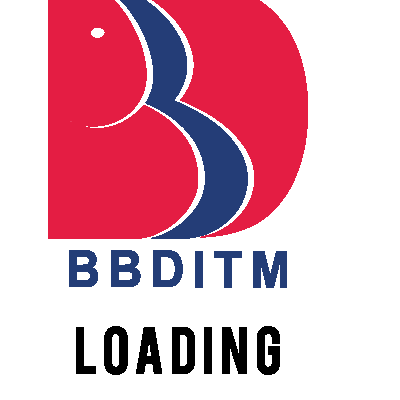Institutional Committees
The main function of this committee is to advise for the improvement of teaching learning process by adopting best practices and guide faculties for the professional career and improve overall academic and administrative environment of the Institution. This committee is constituted at institute level, responsible for regulating and implementing different academic activities. It provides guidance & support in improving and implementation of curriculum at institute level. The committee supervises the teaching learning process on regular basis. Following members constitute the academic advisory committee:
| Convener | Members |
|---|---|
| Dr. Shailendra Singh Chauhan (Director)- Chairman Dr. Pooja Singh (HOD, HU) – Convener | Internal Members |
| |
| External Members | |
| |
| Frequency of Meeting | Once in a semester |
Role and Responsibilities:
The role and responsibilities of the Academic Advisory Committee are as follows:
- Monitoring the programs of internal reviews of learning and teaching.
- Offer guidance to the College on existing and proposed academic programs and research.
- Provide a connection to potential internships/training opportunities for students, employment opportunities for graduates, and to potential research and service opportunities for the faculty.
- Finalization of workload, lab distributions and framing of regular time tables.
- Review of academic activity, attendance, student feedback analysis with class teachers.
- Recommend ways to improve and develop the training, and skills programs offered by the college.
- Monitoring the progress of teaching and learning as per the prescribed syllabus.
- Preparation of academic calendar.
- Identifying speakers and organizing guest lectures.
- Identification of course and framing of syllabi for certificate courses for skill development.
- Initiate innovative practices in teaching and learning.
In case of any Query or Issues , please contact.
 Dr. Shailendra Singh Chauhan
Dr. Shailendra Singh Chauhan
Chairman , Academic Advisory Committee – BBDITM
Email : director@bbdnitm.ac.in
Overview of IQAC: The IQAC of BBDITM has continuously endeavored to improve quality and support initiatives to enhance academic related activities. The committee, within its preview, aims to act as a quality assurance unit inside the institute, with the aim of developing methods for improving quality and eradicating flaws, directing the institutes efforts toward achieving all-around academic success.
The functions of IQAC are listed below:
- To develop a system for conscious, consistent and catalytic action to improve the academic and administrative performance of the institution.
- To conduct quality checks on different activities undertaken in all departments/ sections/ student activity centers of the institution to meet expected outcomes and institutionalization of best practices.
Committee Members: Under the Chairmanship of Director of the Institute, the Internal Quality Assurance Committee of BBDITM has been constituted as per the norms of AICTE and guidelines prescribed by NBA, with following members under varying categories.
In case of any Issue or Query , please contact.
| Convener | Members |
|---|---|
Dr. Shailendra Singh Chauhan Dr. Supriya Phurailatpam Mr. Achman Mishra |
|
| Frequency of Meeting | Twice in a Year |
IQAC Mechanism:
- Ensuring timely, efficient and progressive performance of academic and administrative activities.
- Adoption of relevant and quality academic and research programmes.
- Optimization and integration of modern methods of teaching and learning.
- Ensuring the proper allocation, adequacy and maintenance of support structure and services.
Roles and Responsibilities:
- Ensure heightened level of clarity and focus on institutional functioning towards quality enhancement.
- Assess the activities involved in developing learning outcomes, design and development activities in curriculum, teaching-learning process, student learning assessment process and student engagement programs.
- Assess the quality and quantity of research outcomes during last three years.
- Ensure the quality of resources and general ambiance from perspective of meeting the learning outcome.
- Promote adoption of best practices.
- Act as a dynamic system for quality changes in the colleges
- Build an organized methodology of documentation and internal communication.
In case of any Query or Issues , please contact.
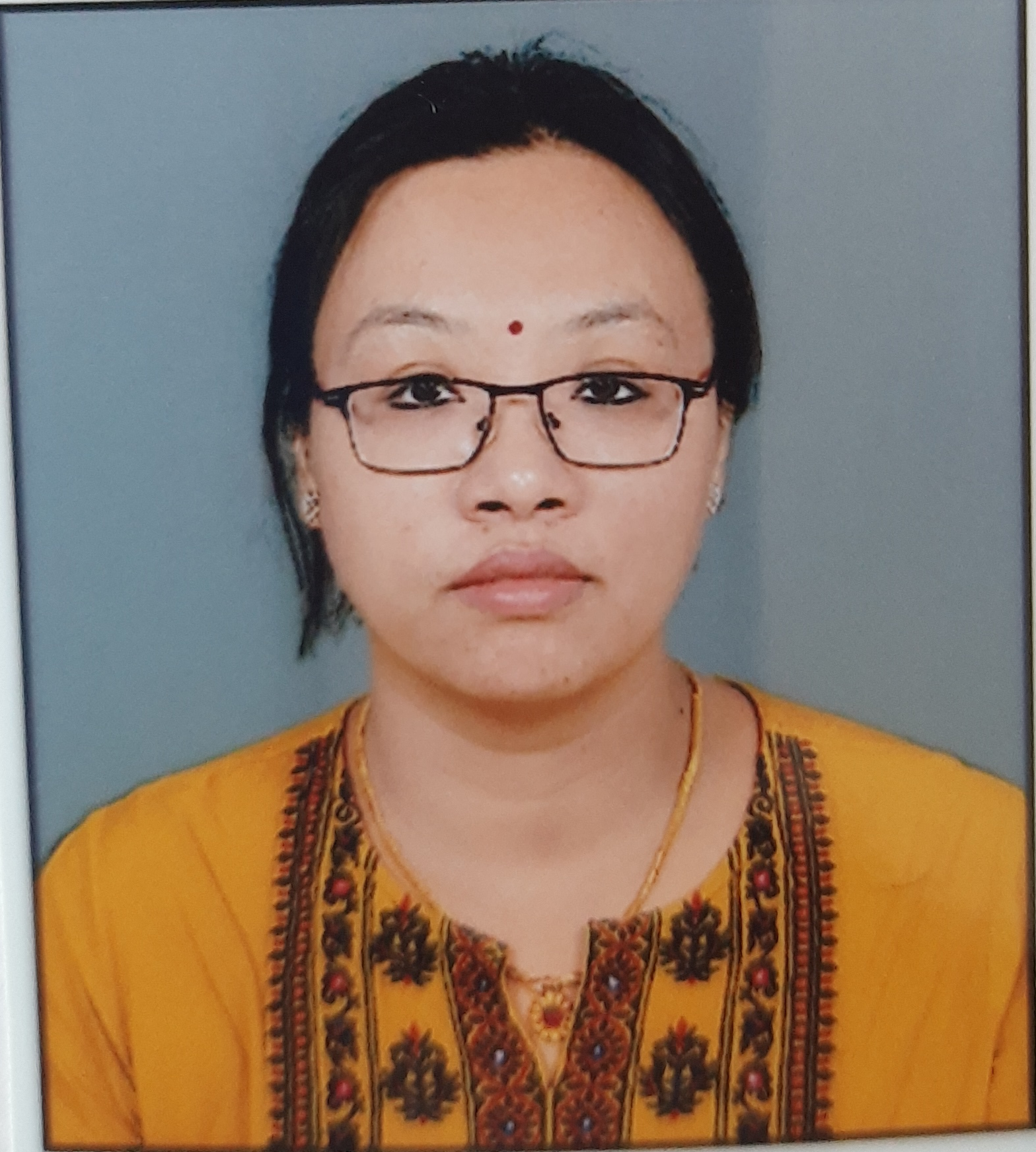 Dr. Supriya Phurailatpam
Dr. Supriya Phurailatpam
Convener, IQAC BBDITM
Email : phsupriya@bbdnitm.ac.in Mob. : 8318088682
This cell is established to provide the employees and students easy and readily accessible mechanism for the speedy disposal of grievances.
The composition of Grievance Redressal Committee for faculty and students are as follows:
| Convener | Members |
Dr. S. H. Abdi
|
|
Dr. Pooja Singh |
|
| Frequency of Meeting | Once a semester and as required. |
- For Students
A student’s complaint will be investigated by the Grievance Redressal Committee (GRC), which will thereafter take the appropriate action. The online complaint/suggestion box on campus allows students to express their complaints about any academic or non-academic problem.
Policy Covers the following points:
- The Grievance Redressal Committee is empowered to look into matters of harassment.
- Anyone with a genuine grievance may approach the Grievance Redressal Committee members in person. In case the person is unwilling to appear in self, grievances may be sent in writing.
- Grievances may also be sent through e-mail to the officer in-charge of Students’ Grievance Redressal Committee or Principal.
- Giving students advice on how to treat one another with respect, decency, and tolerance if any disagreement develops.
Roles and Responsibility:
Students GRC has following roles and responsibilities:
- To formulate the policy to investigate and review complaints or grievances of students
- To investigate the cause of grievances.
- To ensure an effectual solution depending upon the gravity of the matter.
- Encouraging the Students to express their grievances / problems freely and frankly, without any fear of being victimized.
Scope: The Committee deals with Grievances received in writing from the students about any of the following matters: –
- Academic Matters: Related to timely issue of duplicate Mark-sheets, Transfer Certificates, Conduct Certificates or other examination related matters.
- Financial Matters: Related to dues and payments for various items from library, hostels etc.
- Other Matters: Related to certain misgivings about conditions of sanitation, availability of transport etc.
Mechanism:
The Committee performed the below mentioned functions continuously to make the best possible efforts to create a harmonious and conducive atmosphere for everyone in question:
1. The cases are attended promptly on receipt of written grievances from the students.
2. The Committee formally meets to review all cases, prepares a statistical report about the number of cases received, attended to and the number of pending cases, if any, which require direction and guidance from the higher authorities
3. The functions of the Committee are to look into the complaints lodged by any student and judge their merit.
4. To sustain strict confidentiality, if necessary.
Procedure of the GRC are as follows:
- The following link provides a means for students to submit their complaints online https://bbdnitm.ac.in/grievances/.
- The setting of the Grievance Redressal Committee for students will be widely published.
- The students may feel free to put up a grievance in the format attached and drop it in boxes placed at conspicuous locations.
- The GRC will act upon those cases which have been forwarded along with the necessary documents.
- The GRC will take up only those matters which have not been solved by the different departments. Grievances related to fees etc. will be taken up only if the relevant financial documents like demand drafts etc. are attached.
- For Faculty and staff
A Grievance Redressal Committee for faculty and staff has been constituted for the Redressal of the problems reported by the faculties or staff members of the College with the following objectives:
1. To cater to the needs of the faculty and staff and also to deal with Grievance if reported by faculty and staff.
2. Upholding the dignity of the College by ensuring a strife free atmosphere in the College through promoting cordial Employee-Employee relationship and Employer-Employee etc.
3. Encouraging the faculty and staff to express their grievances/ problems freely and frankly, without any fear of being victimized.
4. Advising faculty of the College to appreciate the rights and dignity of one another and show utmost restraint and patience whenever any occasion of rift arises.
Mechanism of Committee: The following mechanism may be used to lodge and resolve grievance (s)
1. The aggrieved faculty or staff may feel free to put up a grievance drop in box at the E- Block.
2. Grievances may be also sent through online via link https://bbdnitm.ac.in/grievances/ (https://bbdnitm.ac.in/grievances/)
3. The aggrieved faculty or staff may also write to Grievance Redressal Committee, BBDITM.
4. The Grievance Cell will act upon those cases which have been forwarded along with the necessary documents.
5. The Grievance Cell will ensure that the grievance has been properly solved in a stipulated time limit provided by the committee.
6. The grievance Redressal cell of the college shall monitor status and progress of grievance Redressal and shall furnish report on grievance Redressal position to the Chairman of the committee.
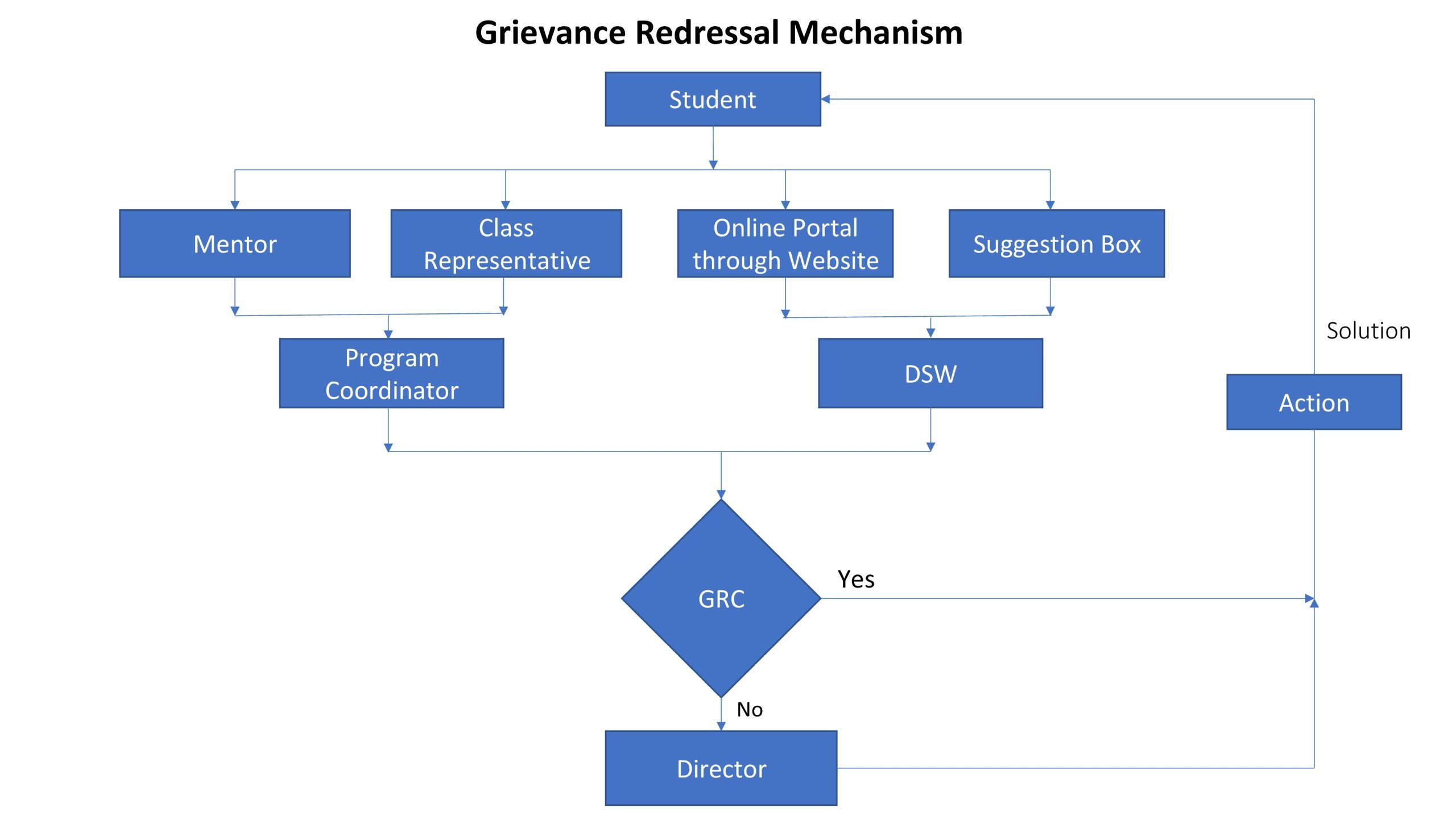 Objective of Grievance Redressal Committee
Objective of Grievance Redressal Committee
1. To uphold the dignity of the College by ensuring strife free atmosphere in the College through promotion of cordial Student-Student relationship and Student-Teacher relationship etc.
2. To provide responsive, accountable and easily accessible machinery for settlement of grievances and to take measures in the college undertakings to ensure expeditious settlement of grievances of Students in order to maintain a harmonious
educational atmosphere in the institute.
3. Encouraging the Students to express their grievances/problems freely and frankly, without any fear of being victimized.
4. Advising Students of the College to respect the right and dignity of one another and show utmost restraint and patience whenever any occasion of rift arises.
5. To support, those students who have been deprived of the services offered by the College, for which he/she is entitled.
6. To ensure effective solution to the student’s grievance with an impartial and fair approach.
In case of any Issues or Query , Please Contact.
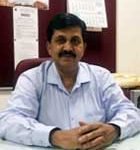 Dr. S. H. Abdi Dr. S. H. AbdiConvener , Grievance Readdresal Committee (Student) – BBDITM Email : dsw@bbdnitm.ac.in Mob. +91-9918577151 |  Dr. Pooja SinghConvener , Grievance Readdresal Committee (Faculty & Staff) – BBDITMEmail :hodhu@bbdnitm.ac.inMob. +91-9415434686 |
In order to compliance with the Provisions laid down by the Scheduled Castes and the Scheduled Tribes (Prevention of Atrocities) Act, 1989, Act No. 33 OF 1989, dated 11/09/1989) & the Notification No. GSR – 316 (E) by Ministry of Welfare, New Delhi dated 31/03/1995 and as per the AICTE Directives to be adhered and followed by the Educational Institute in this regard, following shall be the SC/ST Committee of BBDITM.
| Convener | Members |
|---|---|
| Dr. S. S. Chauhan (Director) |
|
| Frequency of Meeting | Once in a semester and as required |
Objectives
The following are the objectives of the Committee:
- For prevention of atrocities against SC/ST students under the Act No. 33 of 1989, Scheduled Castes and the Scheduled Tribes
- To hear and resolve the issues/complaints if any; of such nature of Atrocity reported/complained.
- To counsel and guide SC/ ST students and help them to manage academic and personal issues of college life effectively.
- To aware the SC/ST students regarding various scholarships program of Central Govt., State Govt. and UGC.
Mechanism of Committee:
The SC/ST Cell was established in BBDITM to co-ordinate in the implementation of the various policies and programmes launched by the Central Government, MHRD, UGC and State Government for the benefit of the SC/ST students. The SC/ST committee shall endeavour to evolve a mechanism:
- To undertakes the activities to develop awareness among the SC/ST students, especially from the rural areas.
- To facilitate financial support to students from these communities from government agencies and other sources.
- To enrol for career orientation programs, to equip them with the necessary skills to choose a career option.
Roles and Responsibilities:
The Roles and responsibilities of the committee are as follows:
- To function as a Grievances Redressal Cell for the grievances of SC/ST students of the college and render them necessary help in solving their academic as well as personal career problems.
- To promote higher education among these two communities suffering economic, social and educational deprivation.
- To collect reports and information of Central Govt., State Govt. and UGC’s orders on various aspects of education, employment of SC/ST & OBC Students.
- To circulate Central Govt., State Govt. and UGC’s decisions about different scholarship programs.
- To communicate with the students and motivate them for better future planning.
In case of any issues or query , please contact

Dr. Shailendra Singh Chauhan
Director , BBDITM
Email : director@bbdnitm.ac.in
Anti-Ragging Committee to ensure compliance with the provisions of Regulations as well as the provisions of any law for the time being in force concerning ragging; and also, to monitor and oversee the performance of the Anti-Ragging Squad in prevention of ragging in the institution. As per the order of Supreme Court of India and subsequent Notification from University Grants Commission (UGC) & AICTE, ragging constitutes one or more of any intention by any student or group of students on:
- Any act of Indiscipline, Teasing or Handling with Rudeness.
- Any act that Prevents, Disrupts the Regular Academic Activity.
- Any activity which is likely to cause Annoyance, hardship, Psychological Harm or creates Fear or Apprehension.
- Any Act of Financial Extortion or Forceful Expenditure.
- Any Act of Physical Abuse causing Assault, Harm or danger to Health.
- Any Act of abuse by spoken words, emails, SMS or public insult etc.
- Any Act of injury or infringement of the fundamental right to the human dignity.
- Any Act of Wrongful Confinement, Kidnapping, molesting or committing unnatural offences, use of criminal forces, trespass or intimidation.
- Any unlawful assembly or conspiracy to ragging.
Punishment to those found guilty
Any student or group of students found guilty of ragging in the campus or even outside the campus shall be liable to one or more of the following punishments:
- Debarring from appearing in any sessional test / University Examination
- Suspension from attending classes and academic privileges
- Withdrawing scholarships and other benefits
- Suspension from the college for a period of one month
Objectives of Anti Ragging Committee
Following are the objectives of Anti-Ragging Committee:
- Anti-Ragging Committee responsible for inculcating Culture of Ragging Free Environment in the Campus as per guidelines provided by Government.
- Anti-Ragging Committee will be involved in designing strategies and action plan for curbing the Menace of Ragging in the college by adopting array of activities.
- The Proctorial board members are assigned the works of checking places like Hostels (Boys and Girls), Buses, Canteens, Classrooms and other places of student congregation.
Responsibilities of Anti Ragging Squad
- The major postulate of the Committee is to maintain the overall discipline in the Institute campus including hostel, mess, canteen and student transport.
- To stop any behaviour that might be construed as taunting, treating, or handling another student in an unkind manner, whether it be by words, actions, or both, whether it be spoken, written, or both.
- To prevent any student from engaging in boisterous or unruly behaviour that annoys or is likely to annoy, burden, inflict bodily or psychological injury, or to inspire fear or concern in any freshmen or other student.
- To keep an eye out for any behaviour on the part of a senior student that inhibits, impedes, or otherwise upsets another students or a freshmens usual academic activities.
- To avoid any verbal or physical abuse, as well as public insults and other behaviour that may cause a fresher or another student to feel uncomfortable, whether it be by active or passive participation.
Mechanism: Following are the Mechanism of Anti-Ragging Committee:>
- Spread awareness of Institute rules and regulations and maintain discipline in the campus.
- If any indiscipline occurs in the campus, student shall bring it to the notice of committee through proctor.
- A meeting shall be called to discuss the complaint.
- The views of each individual member shall be taken during the meeting.
- The recommendations of the members shall be sought regarding the issue.
- Anti-Ragging Squad will be working under the Monitoring of Proctorial Board and will seek advice from the Proctorial Board.
- To keep a vigil and stop the incidences of Ragging, if any, happening / reported in the places of Student aggregation including, Classrooms, Canteens, Buses, Grounds, Hostels etc.
- A gamut of positive reinforcement activities is adopted by Anti-Ragging committee for orienting students and molding their personality for a better cause.
Committee Members :-
| Convener | Members |
|---|---|
| Dr. Shailendra Singh Chauhan (Director) |
|
Anti-Ragging Squad | |
| Dr. S. H. Abdi (Dean Student Welfare and Registrar) |
|
| Frequency of MeetingTwice a semester and as required. | |
In case of any Issue or query ,please contact.
 Dr. Shailendra Singh Chauhan Dr. Shailendra Singh ChauhanConvenor , Anti-Ragging Committee – BBDITM Email : director@bbdnitm.ac.in |  Dr. S. H. Abdi Dr. S. H. AbdiConvenor: Anti-Ragging Committee – BBDITM Email : dsw@bbdnitm.ac.in Mob. +91-9918577151 |
The Sexual Harassment of Women at Workplace (Prevention, Prohibition and Redressal) Act, 2013 is India’s first law against prevention, prohibition, and redressal of sexual harassment for women at the workplace. The Act, along with its rules, is collectively called the POSH law. The POSH Act of 2013 builds upon the Vishaka guidelines laid out in 1997 by the Supreme Court of India. The act applies to women working in the private, government, and informal sectors. As per the government guidelines BBDITM, Lucknow has also framed ICC Committee at institute level.
The composition of Internal Complaint Committee are as follows:
| Convener | Members |
|---|---|
| Dr. Pooja Singh (HOD, HU) (Convener) Dr. Richa Tandon (Presiding Officer) | 1. Dr. S. H. Abdi (DSW, Registrar) 2. Dr. Rupali Agrawal (EC) 3. Mr. D.S. Ray (HOD CE) 4. Ms. Vandana Tripathi (CSE) 5. Mrs. Kanika Lamba (EE) 6. Mr. Suneet Srivastava (Lab Staff) 7. Ms. Poornima Verma (Lab Staff) 8. Ms. Neelam Singh (Non-Teaching Staff) 9. Ms. Abhisakshi Srivastava (CS- 4 Year Student) 10. Ms. Jyoti Singh (CS- 4 Year Student) 11. Mr. Avi Agarwal (EN- 4 Year Student) 12. Ms. Vandana Awasthi (NGO) 13. Mr. Abhishek Chaudhary (Advocate) 14. Mr. Mukesh (Accounts) |
| Frequency of Meeting | Once a semester and as required. |
Main Objective of ICC:
To ensure the implementation of the policy in letter and spirit through proper reporting of the complaints and their follow-up procedures. To uphold the commitment of the Institute to provide an environment free of gender-based discrimination.
Objectives of ICC:
The objectives of the Internal Complaint Committee to Prevent Sexual Harassment of Women at the Workplace are as follows:
1. To develop a policy against sexual harassment of women at the Institute.
2. To ensure the implementation of the policy in letter and spirit through proper reporting of the complaints and their follow-up procedures.
3. To uphold the commitment of the Institute to provide an environment free of gender-based discrimination.
4. To promote a social and psychological environment to raise awareness on sexual harassment in its various forms.
5. To create a secure physical and social environment to deter any act of sexual harassment.
6. To evolve a permanent mechanism for the prevention and redressal of sexual harassment cases and other acts of gender-based violence at the Institute.
ICC Responsibilities
1. Provide a safe working environment.
2. Display the penal consequences of workplace sexual harassment.
3. Employees should undergo POSH training at least once a year.
4. Conduct orientation programmes for the ICC.
5. Assist in any manner required to enable the aggrieved woman to receive justice according to the law.
6. At least one half of the ICC should be women
In case of any Query or Issues , Please Contact.
 Dr. Pooja Singh
Dr. Pooja Singh
Convener, Internal Complaint Committee – BBDITM
Email: hodhu@bbditm.ac.in
Mob. +91-9415434686
Ministry of Human Resource Development (MHRD), Govt. of India has established ‘MHRD’s Innovation Cell (MIC)’ to systematically foster the culture of Innovation amongst all Higher Education Institutions (HEIs). The primary mandate of MIC is to encourage, inspire and nurture young students by supporting them to work with new ideas and transform them into prototypes while they are in formative years.
Objectives of IIC
- To foster the ‘Culture of Innovation’ in the Institute.
- To promote innovative business ideas.
- To orient the students about entrepreneurship and assist them to initiate a start-up.
- To conduct activities as per the IIC calendar.
- To participate in Hackathons and other events organized by Apex authorities.
- Establish function ecosystem for scouting ideas and pre-incubation of ideas.
Mechanism of Committee: MIC has envisioned encouraging creation of ‘Institution’s Innovation Council (IICs)’ across selected HEIs. A network of these IICs will be established to promote innovation in the Institution through multitudinous modes leading to an innovation promotion eco-system in the campuses. The Head of Institution (Directors) nominates any senior faculty having knowledge and interest in the field of entrepreneurship and startups as IIC President.Head of Institution in coordination with IIC President nominate various other coordinators of the IIC and competes the council. These members are selected on the basis of their knowledge and interest in this area. The committee envisages to:
- To organize awareness program on Innovation and Entrepreneurship.
- To organize seminars on Startups and Entrepreneurship.
- To organize ideation contest among the students.
- IAs provide required guidance to the students interested in startups.
- To organize awareness on Intellectual Property Rights.
- To organize industrial visit to sensitize the students for Innovation and Entrepreneurship.
- Students are provided with opportunity to take sessions as resource person to share their expertise or knowledge in any special field.
- Establishment of ecosystem in college to encourage more and more students for startups and entrepreneurship
Institution Innovation Council Member
| Convener | Members |
|---|---|
| Dr. Shailendra Singh Chauhan (Director)_President Dr. Preeti Mishra (Convener) Mr. Vinay Kumar Yadav (Co-convener, ED Cell) | 1. Dr. Abhimanyu Yadav- (EC) Innovation Coordinator 2. Dr. Neha Pandey (ASH)- social media Coordinator 3. Dr. SupriyaPhurailatpam (CE)- NIRFCoodinator 4. Dr Shivangee Tiwari Internship Coordinator 5. Mr. Ashirwad Dubey (EE)- Start Up coordinator 6. Dr Neha Pandey (ASH) -IPR Coordinator 7. Mrs. Neha Gupta (ME)- ARIIA Coordinator 8. Mr. Shivam Dixit (CSE) – NISP Coordinator 9. Mr. Saurabh Saxena (External member) –Vice President IIC |
Policy: the main objective of IIC council is to create a vibrant local innovation ecosystem Start-up/entrepreneurship supporting Mechanism in HEIs. This created ecosystem is utilized for preparation of institute for Atal Ranking of Institutions on Innovation Achievements Framework (ARIIA) Establish Function Ecosystem for Scouting Ideas and Pre-incubation of Ideas Develop better Cognitive Ability amongst Students.
IIC Advisory council
- Saurabh Mohan Saxena, Director, Global Managing, AHODS Technologies
- Dr Madhusudan Pal,Scientist-’F’, Additional Director, Defense Institute of Physiology & Allied Sciences (DIPAS) Defense Research & Development Organization (DRDO),Min. of Defense, Lucknow Road,
- Mr K.P. Singh,President, Laghu Udyog Bharti.
- Dr Sanjay Kumar, mentor of MSH Start-Up hub under Meity, Work experience of setting Up of Incubation centres abroad
- Mr Ranjeew Tiwari (IIT-BHU) successful Entrepreneur Founder of ‘OJOY’ chain of supermarket.
- Mr Akhilesh Shukla, IIM Lucknow Alumni Freelancer in Entrepreneurship and Start- Up consultancy
- Mr Nitin Lahoti, Manager Innovation Management, RKVY RAFTAA,CCS, National Institute of Agricultural Marketing Jaipur
- Mr Manish Kothari,CEO, Rhino Gujarat
- Dr Mahip Singh Head, Innovation Hub, AKTU
Roles and Responsibilities
- To create a vibrant local innovation ecosystem.
- To create Start-up supporting mechanism in HEIs.
- Prepare institute for Atal Ranking of institutions on innovation achievements framework.
- Establish function ecosystem for scouting ideas and pre-incubation of ideas.
- Develop better cognitive ability among students.
- To conduct various Innovation, IPR and entrepreneurship-related activities prescribed by MIC in time bound fashion.
- Identify and reward innovations and share success stories.
- Organize periodic workshops/ seminars/ interactions with entrepreneurs, investors, professionals and create a mentor pool for student innovators
- Network with peers and national entrepreneurship development organizations.
- Create an Institution’s Innovation portal to highlight innovative projects carried out by institution’s faculty and students.
- Organize Hackathons, idea competition, mini-challenges etc. with the involvement of industries.
In case of any Issues or query ,please contact .
 Dr. Preeti Mishra
Dr. Preeti Mishra
Convener, IIC – BBDITM
Email: iic@bbdnitm.ac.in
Mob. :+91-7800297887
A platform for encouraging filing of IPRs and patenting the products/technologies for the benefit of the Institute and thereby to society at large”
BBDITM has established IP Cell to nurture the spirit of innovation and translate these into products, processes, and services for commercial exploitation in wider public goods. BBDITM encourages all faculty, staff and students to document their IPs, so that these could be safeguarded and utilized for the benefit of nation, the institute and inventors. All employees of BBDITM should inform the IPR cell about any IPRs before filing them either through the cell or through any other means. Additionally, they should mention their affiliation of BBDITM in all IPR filing in aid in the process of commercialization, if possible, later.
Objectives of Intellectual Property Cell
The IP policy of the BBDITM has the following objectives:
- To promote innovations in the areas of technology, sciences, and humanities by nurturing new ideas, research, and scholarship in an ethical environment.
- To create an awareness about IPR / Patent drafting and filing for faculty members, research scholars and students.
- Monetization of the IP assets in the College
- To safeguard intellectual property (IP) rights generated by faculty, students, and staff of BBDITM, by translating their creative work into IP rights, with least possible conflict of interest.
- To organize guest lectures / webinars / workshops and training course on IPR.
- To lay down an efficient, fair, and transparent administrative process for ownership control and assignment of IP rights and sharing of revenues generated by IP, created and owned by BBDITM, Lucknow.
- To spread awareness on intellectual property among the faculties and students of the college by organizing workshops, seminars, and training programs.
- The cell also accelerates the faculties and students in obtaining and enforcing IPRs in the form of patents, copyrights, Trademarks, Industrial Designs, etc.
- The IP Cell provides technical and financial assistance to the faculties and students of the college.
Mechanism of Intellectual Property Cell
- To organize IPR awareness programs for faculties and students on Intellectual Property Rights and Policy.
- To sensitize the students with current issues & challenges in the field of IP at national and international level.
- To conduct outreach programs in the form of workshops, programs, and conferences on areas on IPR.
- To build functional and professional linkages with government agencies and non-government organizations.
- To disseminate knowledge on patents, patent regime in India and abroad and registration aspects.
- To encourage faculty members and Students to go for patentable works.
- To advice and guide faculty and students on the importance of IPR.
Policy of committee
The Institute is committed to promoting, protecting, managing and commercializing Intellectual Property consistent with the recognition that among its primary objects and functions are teaching, research and meeting the needs of the community and society. It supports the commercialization and exploitation of IP, which can provide an additional source of revenue to the Institute and also accrue benefits to staff and students. At the same time, the Institute recognizes traditional academic values and expectations.
Duties and Responsibilities
BBDITM is committed to providing an environment that supports the learning, teaching, scholarship and creative activity of its faculty, students, and staff. With this understanding, the Intellectual Property Rights Policy is intended to support the Institute’s academic mission by:
- Encouraging creativity, excellence, and innovation in teaching, scholarship, research, and creative activity by identifying and protecting the intellectual property rights of faculty, staff, students, and the college.
- Acknowledging and preserving the traditional property rights of scholars, creative artists, and researchers with respect to products of their intellectual and creative endeavors, e.g., books, articles, manuscripts, plays, writings, musical scores, and works of art.
- Increasing the likelihood that creative and scholarly works, ideas, and inventions produced at BBDITM College will be used to advance the state of knowledge and contribute to the public good.
- Assuring compliance with the provisions of agreements with external sponsors.
- Guiding policy and process for the use of intellectual property that has been developed for commercial as well as scientific and scholarly value so that the Creator(s)* and the Institute share any net profits.
IP Cell Members
| Convener | Members |
|---|---|
| Dr. Neha Pandey (ASH) (Chairman) Dr. Preeti Mishra (Convener) |
|
| Frequency of Meeting | Twice in a semester |
In case of any query , please contact.
 Dr. Neha Pandey (ASH)
Dr. Neha Pandey (ASH)
Chairman, IP Cell , BBDITM
Email : pandeyneha27@bbdnitm.ac.in
Mob. +91-9473546173
BBDITM in collaboration with BBD University has established a self-financing Unit under NSS scheme to promote social well-being among community at a large. The Cell spread awareness about various developmental plans, environmental issues, health, and education avenues to all the sections of society.
The National Service Scheme (NSS), a voluntary and value- based student youth programme, is one of the major youth schemes being operated in the Ministry of Youth Affairs & Sports. The Scheme was launched with the primary objective of developing the personality and character of the student youth through voluntary community service. It was launched on 24th September 1969, during the birth centenary celebration of Mahatma Gandhi, in 37 universities involving 40,000 students. As on 31.03.2017, NSS had about 38.60 lakh volunteers enrolled in 41,442 NSS units spread over 402 Universities/ +2 Councils, 16,331 Colleges/ Technical Institutions and 11,894 Senior Secondary Schools. So far, over 4.87 crore students have benefitted from this largest student-volunteership programme in the world.
Aims & Objectives:
The aims and objectives of the NSS are:
(i) To render service to the community while studying in an educational institution;
(ii) To arouse the social conscience among students;
(iii) To provide them with an opportunity to work creatively and constructively with the community around the educational campus; and
(iv) To put the education they receive to concrete social use; and specifically,
(v) To work with and among the people;
(vi) To engage in creative and constructive social action;
(vii) To enhance knowledge of oneself and the community through a face-to-face with reality;
(viii) To use the knowledge gained in the classroom in a practical way for mitigating at least some of the social problems;
(ix) to gain skills in programme development to be able to be self-employed. The goals are to achieve improvement
in personality, leadership qualities, national outlook and a sense of civic responsibility.
Motto:
The motto of the NSS is ‘NOT ME BUT YOU’. This expresses the essence of democratic living and upholds the need to appreciate the other person’s point of view first and to show consideration for fellow human beings. It also underlines that the welfare of the individual is ultimately dependent on the welfare of Society as a whole. NSS attempts to establish meaningful linkages between “Campus and Community”, “College and Village” and “Knowledge and Action
Following are the members of Cell:
| Convener | Members |
| Dr. S. H. Abdi (DSW, Registrar) |
|
| Frequency of Meeting | Once in a semester |
Mechanism of Committee
In total five and a 10-day Special Camping forms an integral part of the National Service Scheme. It has special appeal to the youth as it provides unique opportunities to the students for group living, collective experience sharing and constant interaction with community.
Policy of committee
The aim of the Regular and special Camping Programme is to bring youth face to face with the community and make efforts to improve their life. The NSS volunteers are to devote about 80 hours in Regular Activities for the development of the adopted village. Special Camping has been conceived as an opportunity to live with that community for 7 days and experience the conditions and problems of the people. The NSS volunteers need to be inspired to take initiatives for the improvement of their condition. Although the focus of the Special Camps changes periodically and regular programmes are organized in response to the community needs at the micro-level.
Duties and Responsibilities
- The major duties and responsibilities of the cell include work in rural areas, adopted villages and school to the serving the cause of society through survey, education and health awareness programme.
- The cell also focused on production-oriented programs.
- The cell participates in various youth programs, republic day and Independence Day parade, youth festivals etc.
In case of any Issues or query , Please contact.
 Dr. S. H. Abdi
Dr. S. H. Abdi
DSW,BBDITM
Email: dsw@bbdnitm.ac.in
Mob. :+91-99185 77151
The alumni Committee of BBDITM is established with an objective to strengthen the bond between the institute and alumni for a mutually beneficial cordial relationship. The Committee facilitates Alumni interface with the Administration and students through a proper alumni meet which is conducted once a year. The committee also organizes alumni interaction sessions for the current batch of students from time to time on an emerging topic.
Objectives of Alumni Cell
- To keep a roster of all Alumni of BBDNITM with their updated and current information.
- The Alumni cell aims to keep the Alumni connected to the College via events, guest lectures, reunions and networking opportunities.
- To promote sense of belongingness among the Alumni by being in regular contact with them.
- To provide a forum for the Alumni for exchange of ideas on academic, cultural and social issues by organizing and coordinating reunion activities.
- To extend the help to the students of BBDNITM for placement and industrial training.
- To act as a bridge between college and the industries for interaction on new developments in different disciplines of engineering.
- To assist the college to promote R & D activities, testing and consultancy
- Provide valuable suggestions through feedback system and taking offline/online lectures on demand.
Roles & Responsibilties
- To prepare database of our alumni for networking.
- To manage web portals and social media handles for alumni cell.
- To establishes alumni chapters.
- To establish the network with alumni passing out every year.
- To organize the alumni meet & Interaction Sessions.
- Adopt the core values of excellence, lifelong relationships, lifelong learning, Advocacy
- Anti-Ragging Squad/ Proctorial Board Committee
Alumni Cell Members
| Convener | Members |
|---|---|
| Dr. S. H. Abdi (Dean Student Welfare) |
|
| Frequency of Meeting | Twice in a semester |
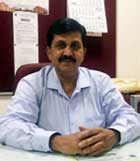 Contact Person :
Contact Person :Dr. S. H. Abdi
Head Alumni Cell,BBDITM
Email: alumnicell@bbdnitm.ac.in
Mob. +91-9918577151
The Cultural Committee of BBDITM aims to indoctrinate and imbibe in the students the notion of Unity in Diversity and enable them to expand their academic and industrial skills. It endeavors to become a committee that can give a platform to the students to showcase their creative expertise while giving importance to the rich cultural heritage of the nation.
Objective:
To promote and arrange extracurricular activities to bring out the talents of students in the performing arts.
Responsibilities:
a) The Cultural Committee shall be responsible for all intra and inter collegiate cultural events in the College. b) To plan and schedule cultural events for the academic year. (Tentative dates to be included in the academic calendar of the institute.) by delegating various tasks.
c) To organize cultural events
d) To communicate about various festivals and events to be celebrated in the college and give a wide publicity.
e) Arranging events/programs for staff and students in coordination with ‘Students Cultural Committee’.
Committee Policy
Following are the rules and actions that need to be followed –
- Program and procedure practiced in the committee should remain confidential to the committee members.
- All the records and documentation should be maintained after every program.
- No use of offensive / abusive language is allowed within the committee program.
- Maintain cordial relationship within committee members.
- Unanimous decisions with prior discussion shall be made in the committee.
Mechanism of Committee:
- Selection of Clubs Members
- Notification of extracurricular activities
- Performance of team at Inter and Intra Collegiate level
- Social Welfare activities to enhance social awareness
- Enhancing and boosting the technical skills among students
- Development of managerial talents among students
| Convener | Members |
|---|---|
| Dr. Pooja Singh (HOD, HU) |
|
| Frequency of Meeting | Twice in a semester |
In case of any Query or Issues , Please Contact.  Dr. Pooja Singh
Dr. Pooja Singh
Convener, Cultural Committee – BBDITM
Email: hodhu@bbditm.ac.in
Mob. +91-9415434686
Examination Committee :-
An asset of the Institution has always been the Examination Committee. The Committee has been in charge of ensuring that all of the College’s internal and external examinations are successfully conducted in accordance with AKTU standards with the utmost commitment and loyalty.
Objective
- Smooth and Fair Conduction of internal / External Examination (AKTU) is the principal objective of Examination Committee.
- The Committee has demonstrated its perseverance and competence by quickly conducting several additional AKTU examinations.
- To publish the results and take necessary steps for the conduct of supplementary exams in time.
- To address the grievances/ complaints of the students and staff concerning exam-related issues.
Roles and Responsibilities :-
- The Examination Committee shall prepare relevant date for the Sessional and Pre University Examination.
- The Examination Committee shall make the Block and Seating Arrangement and display them on the concerned Notice Board/Website and Blocks.
- The Exam Committee shall hold a pre-exam meeting to brief the members of faculty with regard to the examination procedures and the role and responsibilities.
- The Controller of Examination shall ensure that the evaluation and moderation process is completed on time.
- The Controller of Examination along with Exam Cell shall be in touch with the University for obtaining necessary approvals on time
- Preparation of smooth conduct of Examinations, preparation of time – table schedules, Invigilation duty chart, Seat allotment in the Examination halls etc.
Committee Members
Following are the members of examination committee:
| Convener | Members |
|---|---|
| Mr. Shivanand (EE) (Controller of Examination) |
|
| Frequency of Meeting | Three times in a semester |
Mechanism of Committees:
- Master Chart, Seating Plan and Subject Master
- Evaluation & Assessment of subjects
- Conduction of Internal & External Exam
- External Practical (Allocation of Students)
- Invigilation Duties of internal and external exams
- Admit Card distribution to departments
- Moderation of question paper
- Registration of faculties in AKTU portal
Note: In Short the committee should Prepare Invigilation Duties, Admit card distribution, Preparation of Sessional Schedule, Send Exam Copies to Every Deptt., Prepare Seating Plan, Master Plan, Stick all Plans on Notice Board and Classroom, Send Exam Copies to Every Deptt., Prepare Per Day Absentee, Present, Debarred Status, Summary, Copy Collection Chart, Docket in semester exams, maintenance of copy utilization sheet, Prepare Sessional Copies and Room File, Attendance Sheet, Absentee Status, Seating Plan, Prepare All question paper Envelop, Room File, Stickers, Room Numbers, All Question Paper Collection and Printing, Send Exam Copies to Every Dept., maintenance of copy utilization sheet.
In case of any issues or Query Please contact.
 Mr. Shivanand
Mr. Shivanand
Controller of Examination , BBDITM
Email : coe@bbdnitm.ac.in
Mob. : +91-9450136077
BBDITM formed a timetable committee with an objective to frame a suitable, clash free timetable for conducting Theory/Practical Timetable as per AKTU rules and guidelines. It is a necessary tool for efficient working in college.
Objective:
- Prepare the timetables in the prescribed format at the beginning of every semester.
- Every activity is planned according to the timetable and calendar.
- To collect information on various academic/curricular and extension activities planned by various committees.
- To coordinate the timetable preparation for each department by respective HODs in every semester.
- Committee consists of one senior faculty as a Convener and one faculty member from each department.
Following are the members of Timetable Committee:
| Convener | Members |
| Mr. Shivanand (EE) (Controller of Examination) |
|
| Frequency of Meeting | Five times in a year |
Mechanism
- To Ensure better utilization of time and resources.
- Taking time slot/Lab Slot from each deptt.
- Preparing the class and lab Time-tables format at the beginning of every semester.
- Co-ordinate to all other departments for no clashing
- Also Taking time slot from library
- While assigning the subject, one should first give load to the new faculty, then to the existing faculty and then heads.
- Preparing Faculty Timetable and balanced workload in order to have better performance
- To allot subjects to the faculty based on their specialization and preferences.
- Students should be given more and more choices of elective subjects.
- Send the AKTU syllabus Review/ Suggestion points, if any through mail.
- Posting the class and lab Timetables on the respective classroom boards.
- Makes necessary changes in the time-table in case of clash of timing.
In case of any issue or query ,please contact.
 Mr. Shivanand
Mr. Shivanand
Controller of Examination , BBDITM
Email : coe@bbdnitm.ac.in
Mob. : +91-9450136077
BBDITM hostel and mess committee is responsible for the efficient functioning of the hostel and mess facilities at campus. Committee formed to manage the hostel and mess infrastructure and other initial facilities.
The Hostel and Mess Committee is Constituted by Following Members:
| Convener | Members |
|---|---|
| Dr. S. H. Abdi (Dean Student Welfare) |
|
| Frequency of Meeting | Twice in a semester and as required |
Roles and Responsibility:
- To create an overall disciplined environment in the hostel.
- To provide them with a favorable environment necessary for their growth.
- To provide amenities for their recreation.
- To organize various extracurricular activities and sports events in the hostel to bring out creative abilities of students.
- To create a homely environment.
- To provide good, healthy and hygienic food.
- The committee shall create a positive ambience in hostels.
- Promoting team spirit and cooperation amongst the students by creating a healthy environment.
- Motivating students for extracurricular activities and sports events.
- Proper maintenance of hostel and mess and to have a check on quality of food.
In case of any issues or query , please contact .
 Dr. S. H. Abdi
Dr. S. H. Abdi
Dean Student Welfare , BBDITM
The Infrastructure and Maintenance Committee shall focus on strategy and high-level policy related to infrastructure that are in line with the AICTE guidelines and therefore ensure that the physical assets are fit for that purpose, now and in the future.
Creation of the Committee
This committee is responsible for developing and implementing strategies for the effective maintenance of the institute’s infrastructure and other related facilitates. The committee ensures that annual building and other maintenance requirements are satisfied. Identification and planning of preventative maintenance needs is also an important one.
Roles and Responsibilities:
1. To review and recommend updates to the campus master plan on a periodic basis
2. Full fill the Norms prescribed by AICTE.
3. Optimize the Resources to its best utilization.
4. Regular Maintenance related to infrastructure should be done.
5. To make recommendations to the BOG regarding campus space allocation to meet
changing institutional needs.
6. To make recommendations on the prioritization of needs for renovation and repairs to
campus facilities and infrastructure, including major technology components
Committee Members :
This Committee consist of the following members:
| Convener | Members |
|---|---|
| Mr. Achman Mishra (Asst. Prof. – ME) |
|
| Frequency of Meeting | Once in a Semester and as required |
Mechanism
- College has an effective and efficient infrastructure and maintenance system.
- Complaints received through digital, or paper mode can be entertained directly by the committee head.
- If any issue related to the additional course, the requirement of infrastructure, furniture and other facilities as per the AICTE norms, submitted to the committee.
- After making appropriate inclusion and exclusion in the prior requirement generated by the department the committee head forward same to the director institute.
- On receiving from the committee head director institute forward the same to the appropriate authority and other onward action.
- Accordingly, maintenance complaints which are raised by the respective departments also submitted through offline or online mode.
- After receiving the maintenance related complaints, the head of the committee forward to the maintenance department for onward action.
In case of any issues or query , please contact.
 Mr. Achman Mishra
Mr. Achman Mishra
Convenor, Infrastructure & Maintenance Committee – BBDITM
Email: nba@bbdnitm.ac.in
Mob. : +91-80904 78278
In order to meet the college requirements for teaching, learning, research, and community development, the Institute initiated a Library Committee. The committee advises and reviews library policies for instruction, resources, services, and the facility.
Objective of Committee:
Advises and reviews library policies for instruction, resources, services, and the facility.
Mission of Committee:
The library committee mission is to create inspiring education by offering exemplary resources for learning and providing best research environments. which will be a Gateway to right and relevant resources, supported by an enabling and user focused service culture.
Policy of Committee:
The library encourages faculty and librarian partnerships to ensure that the collections remain dynamic and meet evolving curricular needs. The Library Committee examines and suggests policies for the library, paying close attention to the library budget. The committee will encourage library employees to utilize cutting-edge tools and software for efficient operation and administration of the library (like koha software).
Roles and Responsibilities of Library Committee
The library committee reviews and recommends Policy for the Library, with particular attention to the collection budget and to the distribution of resources among academic divisions and units.
- Work as an ambassador between the department and library, students and faculty in the department and library.
- Provide the faculties and students in a department with a sense of ownership of the library.
- collecting the requirements of Books and Journals and study materials from the faculties of respective departments based on current requirements, compiled in proper form and recommend for procurement through the head of department.
- Assisting in the administration and implementation of different activities for improving overall library usage.
- Creating awareness amongst the students and faculties in the department about intellectual property right and plagiarism related issues.
- Initiate and host events in the library such as Book Exhibition, world book day, library orientations for fresher’s, awarding students for best library user etc.
- Communicating difficulties, if any, students and faculties of the department are facing in using library facilities.
| Convener | Members |
|---|---|
| Dr. S. S. Chauhan (Director)Mrs. Rekha Agarwal (Librarian) | 1. Ms. Shivangi Singh (CE)
|
| Frequency of Meeting | Once in a Semester and as required |
In case of any Query or Issues , please contact.
 Dr. Shailendra Singh Chauhan
Dr. Shailendra Singh Chauhan
Convener, Library Committee – BBDITM
Email : director@bbdnitm.ac.in
The Institute has established a research and development committee to offer specialized administrative and managerial assistance for the management of sponsored research, consulting, and other R&D-related activities. Institute R and D members selected from all the branches who promote the culture of research at department level as well to promote Research amongst Faculty Members in the form of Quality publications and Patents.
Following members constitute R and D Committee:
| Convener | Members |
| Dr. Manuj Darbari (Professor- CSE) |
|
| Frequency of Meeting | Once in a semester and as required |
Functions of the R and D Committee:
- To create zeal amongst students and faculty members towards research and innovation.
- To promote project labs under research committee
- To monitor progress of the research and development activity.
- To work closely with the industrial needs that eventually will result in new or improved products, processes, systems or services that can increase the company’s productivity.
- To foster collaborations for mutual benefits and to maximize industrial connectivity.
- To establish collaboration with other universities, public and private sectors and identify R&D projects including consultancy services which could be undertaken at the institution.
- To promote research in various departments of the Institute.
- To ensure smooth functioning and effective management of R&D at the institution.
- To motivate students for presenting papers in National and International conferences and projects in competitions Interdepartmental / collaborative work to be encouraged.
Responsibilities:
- The committee shall promote research and development activities by motivating students and members of faculty for publishing research papers
- Motivating them to get patents for their work
- To organize regular seminars and workshops on emerging trends and technologies with a special focus on innovations
- To organize regular industrial trainings for the students commensurate with market needs.
- To organize regular industrial visits for the students
- To organize conference on innovations every year.
- Each Department has R&D coordinators to disseminate the research at the Department al levels and convert the student’s project into quality publication and patents.
In case of any Query or Issues , please contact.
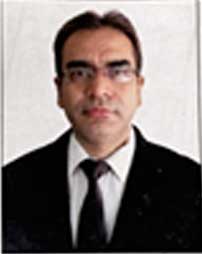 Dr. Manuj Darbari
Dr. Manuj Darbari
Convenor: Research & Development Committee – BBDITM
Email : manujuma@bbdnitm.ac.in
Contact No.: 9918594881
BBDITM establishes the sports committee with an objective to participate in zonal and state level sports events. The Sports Committee plans and executes all the sporting events in BBDITM.
BBDITM, Lucknow has strong belief in a quote that “Healthy mind lives in a healthy body”. Fulfilling to this, Institute provides all types of sports facility like Badminton, Cricket, Football, Basket Ball, Volley Ball, Shot-Put, Javelin Throw, Discuss Throw, Table Tennis, Lawn Tennis, high jump, Long jump, Athletics etc. BBDITM feels proud on their students for continuously winning Gold medals in various sports from last two years in Zonal and State Level competitions organized by AKTU. Students also participated in Udgosh event organized by IIT Kanpur and won gold medal in shot-put.
Objective of Committee
To build team for participating in zonal and state level sports event organized by AKTU, IIT’s and other recognized Tournaments.
Mechanism of Committee
- Trials of different sports.
- Selection of team.
- Selection of Captain and Vice- Captain.
- Practice sessions.
- Participation in events at District, zonal, State, National/International.
Duties and Responsibilities
- From each department a Faculty Co-Ordinator is taken and appointed on various sports event for fair selection and formation of team.
- To build zeal amongst students and faculty members towards sports.
- To assure smooth conduction of sports fest or event within the college.
- To provide a record of sports and other games events participated by students within the college and outside of the college or state.
| Convener | Members |
|---|---|
| Dr. Ankit Asthana (Asst. Prof.- ME) |
|
| Frequency of Meeting | Once in a semester |
In case of any issue or query please contact.
 Dr. Ankit Asthana
Dr. Ankit Asthana
Convener , Sports Committee – BBDITM
Email : statelevelsports@bbdnitm.ac.in
Contact No. : 9919738793
The training and placement committee of the institute facilitates prospective employers by organizing institute-industry interactions regularly through expert talks with the support of all the branches. The committee supports the T and P Cell of institute by providing complete support for arranging placement activities on the campus and recommending students to them for internship and placement. It organizes pre-placement training by way of group discussions, personal interviews and workshops on personality enrichment and communication skills through the help of departments. It also provides recruitment guidelines to students and career guidance to the students.
Members of Training and Placement Committee
| Convener | Members |
|---|---|
| Dr. Anurag Tiwari (HOD – CSE) (Training & Placement Officer)Mr. Rishabh Singh (Executive Manager T&P) | Dept. T&P Coordinator |
| |
| Technical Training Team | |
| |
| Frequency of Meeting | Twice in a semester and as required |
Mechanism of committee:
1. Each department has T&P coordinators.
2. Preplacement training program and management are organized.
3. Students are conveyed with the details of placement drives and their eligibility criteria.
4. The process of recruitment will start accordingly.
Policy: Students eligibility will be finalized at companies’ criteria. Once student is selected, they are intimidated. The responsibility of the students is to see the notice board, WhatsApp group and telegram group for updates at regular intervals.
Duties and Responsibilities
- T&P Committee functions under Training and Placement Head.
- T&P operates all around the year to arrange drives of different companies.
- Main responsibility is to shape students to be readily deployable into industry.
- Members plays crucial role in counselling and guiding the students.
- To provide preplacement training.
- Maintaining and regularly updating Database of Students
- Collecting feedback from employers where our students are placed

Dr. Anurag Tiwari
Convener, Traning and Placement Committee
Email : hodcs@bbdnitm.ac.in
Mob. : 8601008877
BBDITM establishes Career Guidance committee to Provide students with necessary information on further education and careers opportunities; awareness among students to eradicate their confusions related with Career and Showing them the right direction.
ROLES AND RESPONSIBILITIES
- To facilitate the development of an integrated and well-adjusted individual
- To enhance the motivation level of students to accomplish stipulated educational goals.
- To identify the weaker students and assist them to develop up to their potentials.
- To provide optimum assistance to the students with special education needs.
- To ensure that a student is able to successfully deal with the problems and continue with the quality endeavors in her/his academic pursuit
- To provide comprehensive guidance and counseling services needed to become mature and socially responsible individuals.
POLICY
- Self Assessment of students and raising the level of inherent capability to make the students comfortable and bring forth their inherent capabilities, the counseling and guidance must be given to the students in the beginning through various measures viz. tutorials, organizing competitions, group discussion, interactive sessions, e-learning, library usage etc. It is desirable that adequate opportunities may be given to the new entrants i.e. for the 1st year students so that they shed their inhibitions, if any, and in the process the level of their self confidence is also raised.
- Development of Communication Skills and Soft Skills It will be mandatory for all the committees that programmes may be organized to enhance the Soft Skills of the students. Efforts may also be made to improve the Communication Skills of the students through various measures.
- The Language Labs of the nearby Colleges/institutions, wherever possible, can be utilized for the purpose. It is desired that equal weightage be given to the students of all branch. This exercise is to be done with a purpose of making the students confident enough to face any interviews/Group Discussions & other such challenges.
- Guidance/Awareness about opportunities for Competitive Exams and Jobs. The students may be given awareness about the prospects of carrier in their future. They may be made aware about the job opportunities available in their stream/subject in the market/industry.
- Competitive Awareness may also be given to the students. The students may be made aware about usage of library, e-learning, use of website, e-journals etc. Due consideration may be given to the fact that all students are made aware of different competitive exams after the degrees to shape their future course of action.
Following are the Members of Committee:
| Convener | Members |
|---|---|
| Dr. Diwakar Yagyasen (Professor-CSE) | 1. Dr. Pooja Singh (HOD, HU) 2. Mr. Shakti Singh (ME) 3. Mr. Ankur Srivastava (CSE) 4. Mrs. Shubha Mishra (CSE) 5. Ms. Kajal Singh (CE) 6. Ms. Eram Fatima (IT) 7. Mr. Ravi Shankar (EC) |
| Frequency of Meeting | Twice in a semester and as required |
Mechanism of Committee:
1. Organizing Career objective workshops
2. Counseling students regarding future Career
3. Familiarization with Career Goals
4. Preparing guidance sessions for students
Achievements of Career Guidance Cell
- Students successfully cleared GATE.
- Students obtained PG and PhD seats at international universities.
- Most of Students qualified for govt. jobs, PSU jobs and done extraordinarily well in Civil Service and Engineering Services Examinations.
- Many Students setting-up their own entrepreneurship ventures and became successful entrepreneur.
In case of any Query or Issues , please contact.
 Dr. Diwakar Yagyasen
Dr. Diwakar Yagyasen
Convenor, Career Guidance Committee-BBDITM
Email-dylucknow@bbdnitm.ac.in
Mob:- 8127509234
With an objective to Influence the behavioral patterns of the students through emphasizing the practical occupation of the values in the life Institute establishes Value education cell.
ROLES AND RESPONSIBILITIES
- Helping students to better understand the values that guide their own daily lives and contributing to changes in values held collectively by communities and personally by individuals.
- Development of students in physical, mental, and emotional aspect.
- To inculcate good manners, responsibilities of good citizen and develop respect for the dignity of individual and society.
- Enable the students to make decisions on the basis of enlightened Self.
- Conduct various workshops and seminars by eminent personalities for students as well as faculty members.
MECHANISM OF VALUE EDUCATION CELL
- Implementation of Universal Human Value (UHV) courses in the prescribed curriculum proposed by AKTU and AICTE.
- Facilitation of faculty members through FDPs, refresher FDPs and Higher Level FDPs to understand concepts of Universal Human Values.
- To organize International and National conferences to make people aware about UHV concepts around the globe.
- To work as Nodal centre and support Regional Nodal centres of Value Education as well as college level UHV Cell in all ways.
- Generating congenial ambience for value-based education at institute through various means like BOS, Dean UHV, and Nodal Centers etc.
- Preparing Mentors for conducting Student Induction Program.
- Preparing web portal for Universal Human Values activities, Research, documentations etc. – Supporting AKTU, AICTE, UGC and other such bodies for UHV activities.
Policy: The important policy of the committee is to take regular classes on UHVPE and conducting workshop.
Members Value Education Committee:
| Convener | Members |
|---|---|
| Dr. Pooja Singh (HOD, HU) |
|
| Frequency of Meeting | Once in a semester and as required |
In case of any issue or query , please contact .  Dr. Pooja Singh
Dr. Pooja Singh
Convener , Value Education Cell – BBDITM
Email : hodhu@bbdnitm.ac.in
Mob. +91-9415434686
BBDITM establishes the website maintenance cell with an objective to successfully disseminate the endeavors and the accomplishments of the College, Students, faculty to the outer world through Website updates.
Objective
- Identify strategic initiatives for the website and present it to higher management for review and updating.
- Develop a priority listing of desired design and functionality enhancements
- Identify to update and enhance website design and content.
- Coordinating with other committees in posting relevant information
- Web Cell holds a meeting of the committee members on regular basis
Members Website Maintenance Cell
| Convener | Members |
|---|---|
| Mr. Shivam Dixit (Asst. Prof.- CSE) |
Mr. Surya Vikram Singh (CSE) (First Year) |
| Frequency of Meeting | Twice in a semester and as required |
Mechanism of Committee –
- Collection of data from each department (ECE, CSE, ME, CE, IT, EE, HU&AS)
- Department data consist of vision and mission, newsletter about department, faculty detail (Bio-sketch), achievements, events, sports, placements, academics, labs and research activities in department.
- Collection of data from administrative office (admissions details of UG and staff details and transportations data).
- Collection of data from exam cell on regular basis as per AKTU norms.
- Regularly updating events, notices and news conducted in the college department wise.
- Collection of data from placement cell (company name, package, no. of students placed).
- Report all the related activities to the coordinator of the committee and concerned authorities.
Duties and Responsibilities –
- Delivering the information about the college to the outside world via social media handlers (Facebook, Twitter, LinkedIn and Instagram).
- Collection of data from each department (ECE, CSE, ME, CE, IT, EE, HU&AS)
- Department data consist of vision and mission, newsletter about department, faculty, achievements, events, sports, placements, academics, labs and research activities in department.
- Collection of data from administrative office (admissions details of UG and staff details and transportations data).
- Collection of data from exam cell on regular basis as per AKTU norms.
- Regularly updating events, notices and news conducted in the college department wise.
- Collection of data from placement cell (company name, package, no. of students placed)
- Report all the related activities to the coordinator of the committee and concerned authorities.
 Mr. Shivam Dixit
Mr. Shivam Dixit
Website & Social Media Coordinator, BBDITM
Email : socialmedia@bbdnitm.ac.in
Mob. : +91-9001927056
A Purchase Committee is a group of designated faculty /staff established for independent review and evaluation of purchasing documentation whose main role is to recommend the most appropriate supplier or service provider based on price, quality, stock availability, references etc.
Objective
- To supervise all the purchases made in the campus.
- To analyze quotations provided by the office, and provide recommendation for approval.
- To ensure all documentation is accurately completed.
- To ensure that the supplies/services quoted for comply with what was requested
- Seek clarification from suppliers/service providers where necessary
- Where the person with authority to approve the Quote Evaluation Form (QEF) has a query on the PC’s recommendation, this should be directed back to the committee stating clearly the nature of the query
- The PC should also be assigned a role within the supplier pre-preprocessing process
- In certain contexts, it may be appropriate for some or all members of the PC to be directly involved in the collection of quotations
- Ensuring proportionality, transparency, accountability and fairness in the procurement process.
Duties and Responsibilities:
1.To scrutinize all proposal of procurement received through Institute Director.
2.To check and scrutinize proposal of department with respect to requirement, budget and purchase
format 1 and 2.
3.Send to Director for final approval.
4. After getting approval, prepare supply order/work order.
5. After getting duly signed W.O./S. O, send to concerned Hod and other concerned authority for
start of work.
6.After satisfactory completion of work and well verified bill by HoD , scrutinize the bills and
send it for payment.
Mechanism of Committee:
We have very well-defined Procurement policy of the college is to ensure Transparency, fairness and fraud prevention, Equal opportunity, Economy and Efficiency through Effective means. (web link: https://bbdnitm.ac.in/wp-content/uploads/2022/05/procurement-policy.pdf
Policy of committee:
To purchase each and every thing concerned with BBDITM in a competitive rate and provide best quality and maintenance of all record.
Committee Members :
| Convener | Members |
|---|---|
| Prof. D. S. Ray (HoD-Civil) |
|
In case of any Query or issues , please contact.
 Dr. D. S. Ray
Dr. D. S. Ray
Head , Purchase Committee – BBDITM
Email : hodcivil@bbdnitm.ac.in
Mob. :+91-99185 94881
The Budget Committee is an important committee of the institute responsible for recommending budget priorities, procedures, and processes to the College Director. The Budget Committee functions with the help of all the department representatives.
Mechanism: The Following are the steps involve in preparing Budget.
- The Proposed recurring and non-recurring budget of department has been send by HODs to the Budget Committee Co-Convener.
- On receiving of proposed budget a meeting has been called by the co-convener of committee.
- Compilation and selecting of proposed budget items under various head has been finalized by the budget committee with the best of his knowledge.
- Final Budget has been send to the Director Institute for approval and onward action.
Functions
- To collect the budget from different departments under the recurring and non-recurring category.
- To finalize the budget after deletion of certain items.
- Proper monitoring and distribution of budget in different departments.
- Arranging Meeting with departmental budget representatives/heads/PCs.
Following are the Budget Preparation Committee Members:
| Convener | Members |
| Dr. Shailendra Singh Chauhan, (Director)Prof. D. S. Ray (HoD-Civil) (Co- convener) |
|
| Frequency of Meeting | Once in a semester and as required |
In case of any Query or Issues , please contact.
 Dr. Shailendra Singh Chauhan
Dr. Shailendra Singh Chauhan
Chairman , Academic Advisory Committee – BBDITM
Email : director@bbdnitm.ac.in
The Media & Publishing Committee of BBDITM is responsible for managing and fostering the image of BBDITM in the eyes of all the stakeholders. The cell works in the path of strengthening the brand equity of institute and resonates the effective expansion of the institute.
Objectives of the Cell:
- Various types of events are published under the media cell.
- Media cell is also responsible in covering the functions and important events conducted at the Institute.
- Cell also engages in monitoring the events, activities and participation from the institute.
Roles and Responsibility
- Media and Publishing committee is responsible for publishing all the events held at BBDITM .
- Coverage of all the events in different newspaper with in the stipulated time.
- Various types of events are published under the cell.
- Every department representative sends their departmental activity or events in proper format.
- Publicity of the various events on Social handles.
Committee Members
| Convener | Members |
|---|---|
| Mr. Ravi Gupta (Asst. Prof. – ASH) |
|
| Frequency of Meeting | Twice in a semester and as required |
In case of any query or issues , please contact.  Mr. Ravi Gupta
Mr. Ravi Gupta
Convener – Media and Publishing committee, BBDITM
Email : mediacell@bbdnitm.ac.in
Mob. :+91-9621789915
BBDITM establishes the student counseling cell to provide counseling for psychological and other related problems of the students. The cell also works to develop self- confidence for preparation of competitive examinations and develop learning skills among the students.
Objectives:
- Student Counselling Cell aims to help students become self-aware and reach their highest potential while dealing with anxiety and stress
- To help the students in solving their personal, educational, social as well as psychological problems.
- Provide various comprehensive psychological services to students and resolve their emotional, behavioral, academic, and social issues.
- To create awareness about issues and problems related to mental health of student
- To motivate faculty in counselling activities.
- The office of Counselling led by Student Counsellor provides a confidential atmosphere in which the students can explore any topic or situation and discuss any concerns thy may have.
Roles and Responsibility:
- Solve personal problems of student by conducting individual counselling session
- Boost self-esteem of weaker /physically challenged students.
- Diagnose the learning difficulties of students and help them to overcome the same.
- Help the students to overcome examination stress or fear.
- Conduct seminars for students on mental health and addiction issues.
- Refer the students to professional psychiatrics or counsellors in severe cases.
- Inform the parents about psychological misbehavior of the student.
Mechanism of Committee
- The students referred to the Students Counseling Cell through the office of Director-BBDITM, Dean Students Welfare and Students grievances cell will be addressed by the committee.
- The Committee members upon interaction with the students to be counseled will take up the task within the committee first.
- If required the professional counselors from amongst the various institutes/colleges in and around the nearby vicinity will be approached for assistance.
- Incase medical help required parents/guardians of the students will be approached/ contacted to take care of their ward.
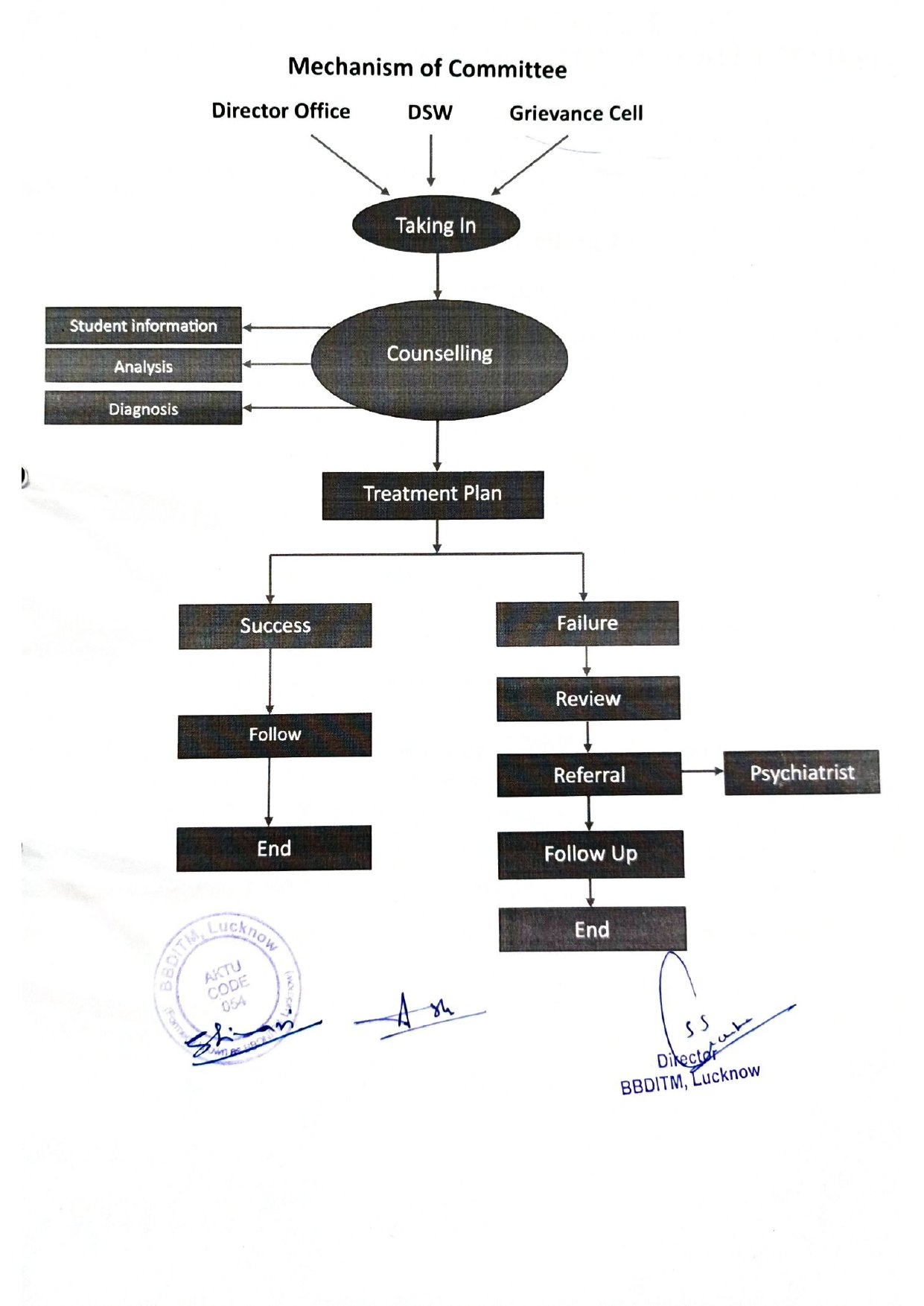
Members of the Committee
| Convener | Members |
| Dr. Shivangee Tiwari (Convener) Mr. Ashwani Kumar Pandey (Co-convener) |
|
| Frequency of Meeting | Twice in a semester and as required |
In case of any query or issues please Contact.
 Dr. Shivangi Tiwari
Dr. Shivangi Tiwari
Convener, Student Counselling Cell – BBDITM
Email : studentcounsellingcell@bbdnitm.ac.in
Mob.+91-9410782087
Differently abled cell has been established in BBDITM with an objective to facilitate equal opportunities to ensure protection to their rights and enhance participation of differently abled person in various avenues without any discrimination. The cell endeavors to sensitize the college community to respect and cooperate with all differently abled persons at institute.
Objective of the Cell:
1)To create an atmosphere of Equal Opportunity through awareness generation programmes.
2) To provide auxiliary support towards skill development and enhancing employability of students.
3) To tailor development and sensitization programmes to meet the distinct needs of the students.
4) To expedite legal redressal in matters of violation of equal opportunity.
Following are the members of Differently abled equal opportunity cell:
| Convener | Members |
|---|---|
| Dr. Anurag Tiwari (HOD, CSE) |
|
| Frequency of Meeting | Once in a semester |
Mechanism of Committee-
The Equal Opportunity Office has been committed to fulfilling its mandate of maintaining social harmony among various sections of the College community. Whenever any case of social discrimination is brought before the Equal Opportunity Office, it is thoroughly investigated and examined and suitable action is recommended. Addressing of issues related to any social discrimination faced by students or staff at any level is amongst the principal objectives of the Equal Opportunity Office.
Duties and Responsibilities
Following are the duties and responsibilities of Cell
- Establishing coordination with government and non-government or and other funding agencies with an objective to provide financial support and other resources required for inclusion and educational empowerment of the students with disabilities.
- Undertaking suitable programs/plans, including remedial classes, assistive technology and services for ensuring participation and improving performance of students with disabilities.
- Providing information about existing provisions and act as a counselling-cum-guidance centre for students with disabilities, especially with regard to academic, career and other matters.
- Taking initiatives to develop a socially conducive, accessible and inclusive atmosphere for the development of healthy interpersonal relations among students with disabilities, academic and non-academic staff for academic interaction and extracurricular activities.
- Supporting the students with disabilities to overcome challenges and barriers originating from inequalities and discrimination at the College within its mandate.
- Taking necessary initiatives to make the infrastructures of the College barrier free or disabled-friendly.
- Organizing or conducting seminars/ workshops/ conferences/exhibitions/special lectures/debates and alike, from time-to-time, on various contemporary and significant disability related subjects for dissemination of knowledge and sensitization of the faculty members of the College about disability and allied aspects.
- Taking initiative to upgrade the Central Library of the College with modern devices and assistive technologies for enabling the students with disabilities to access information like their counterparts.
- Extending support to the students with disabilities to avail scholarships and stipends or financial assistance from governments and other agencies to support their education and other needs.
- Taking appropriate initiatives to ensure that the students with disabilities do have access to various provisions and facilities such as-
(i) 5% reservation of seats in all subjects at all levels;
(ii) reduction of 5% marks from minimum eligibility criteria;
(iii) age relaxation of minimum 5 years for admission;
(iv) 30 minutes of extra time in the examinations;
(v) Scribe to those who are incapable of writing examinations due to disability;
(vi) full or partial exemption from the payment of admission and examination fees in special cases;
(vii) boarding and lodging at the College Hostels for both male and female students with disabilities.

Dr. Anurag Tiwari
Convener, Differently-Abled Person Equal Opportunity Cell
Email : hodcs@bbdnitm.ac.in
Mob. : 8601008877
The Entrepreneurship Development Cell of BBDITM is be dedicated to the cause of promoting entrepreneurial culture among the students. It is working towards establishing a startup ecosystem and provide young entrepreneurs a platform to work out on their ideas and motivate them for their adventurous journey of building a startup from scratch. The ED Cell has organized many activities on entrepreneurial thought process, expert talks, ideating session, brain-storming related to technical, medical, cultural, and social events for helping the ignited youth to take-off from a job seeker to job creator.
Objectives of Cell:
- To develop job creators and make small step for a long journey.
- To develop state of the art infrastructure facility with industry collaboration and support from the Government.
- To promote strong ethos for entrepreneurship among Engineers, Managers and Science students.
- To promote entrepreneurship among relevant sectors in the state. To collaborate with other Organization’s and institutions. To organize entrepreneurship development and awareness programs.
- Encourage students to take up visits to Industry, rural places and hospitals.
- To inculcate a culture of innovation driven entrepreneurship through student projects and motivate, empower women to become entrepreneurs.
- To respond effectively to the emerging challenges and opportunities both at all levels relating to SMEs (Small and Medium-sized Enterprises) and micro enterprises.
- To organize webinars, seminars, workshops short term courses and design ideation contest to facilitate students to become innovators and entrepreneurs.
- To make available in-house developed facilities & technologies to others at a reasonable cost.
Following are the members of committee:
| Convener | Members |
|---|---|
| Dr. Supriya Phurailatpam (Convener) |
|
Mechanism of Committee:
The Institute has envisioned the creation of ‘Entrepreneurship Development Cell’, to promote the ecosystem and culture of startups in the Institute and the campuses. The Entrepreneurship Development Cell (EDC) has been established in the Institute with the financial Aid of AICTE under ministry of HRD. The prime motive of the Cell is to promote entrepreneurial spirit among students of BBDITM and aims to act as one of the biggest platform for BBDITM Faculties, New-age Entrepreneurs, Eminent Business Personalities & the students to gather, learn & share their entrepreneurial endeavors, experiences & aspirations.
The Head of Institution (Directors) nominates any senior faculty having knowledge and interest in the field of entrepreneurship and startups as head of EDC. Head of Institution in coordination EDC Head and IIC Convener nominate various other coordinators of the EDC. These members are selected based on their knowledge and interest in this area. The committee envisages to:
- To organize awareness program on Innovation and Entrepreneurship.
- To organize seminars on Startups and Entrepreneurship.
- To organize ideation contest among the students.
- To organize awareness on Intellectual Property Rights.
- To organize industrial visit to sensitize the students for Innovation and Entrepreneurship.
- Students are provided with opportunity to take sessions as resource person to share their expertise or knowledge in the field of start-ups.
- Establishment of Entrepreneurial ecosystem in college to encourage more and more students for startups and entrepreneurship.
Policy of EDC:
The main objective of EDC is to create a vibrant local innovation ecosystem Start-up/entrepreneurship supporting mechanism in the Institute. The Cell by the means of its various activities aims to motivate young, budding Technology & Science graduates to take up Entrepreneurship as a career & become job provider rather than job seekers. The Cell aims to inculcate the entrepreneurial culture amongst the students which would in turn inspire them to go a step further and take up the challenge of entrepreneurship. The EDC at Institute provides mentoring opportunity by its network of acquaintance allies. Students seek benefit by the experience of these initiatives. The association includes professionals, entrepreneurs, investors, and Industry experts.
Duties and Responsibilities of EDC:
- To promote strong entrepreneurship among Engineers, Managers and Science students.
- To promote entrepreneurship among relevant sectors in the state.
- To collaborate with other Organization’s and institutions.
- To organize entrepreneurship development and awareness programs.
- To undertake research studies to identify high technology areas having entrepreneurship opportunities.
- To develop close links between industry-Institute by interaction programs. High priority to activities designed to bring about improvement in the performance of the industry.
In case of any Query or Issues , please contact.
 Dr. Supriya Phurailatpam
Dr. Supriya Phurailatpam
Convener, ED Cell, BBDITM
Email : phsupriya@bbdnitm.ac.in Mob. : 8318088682
